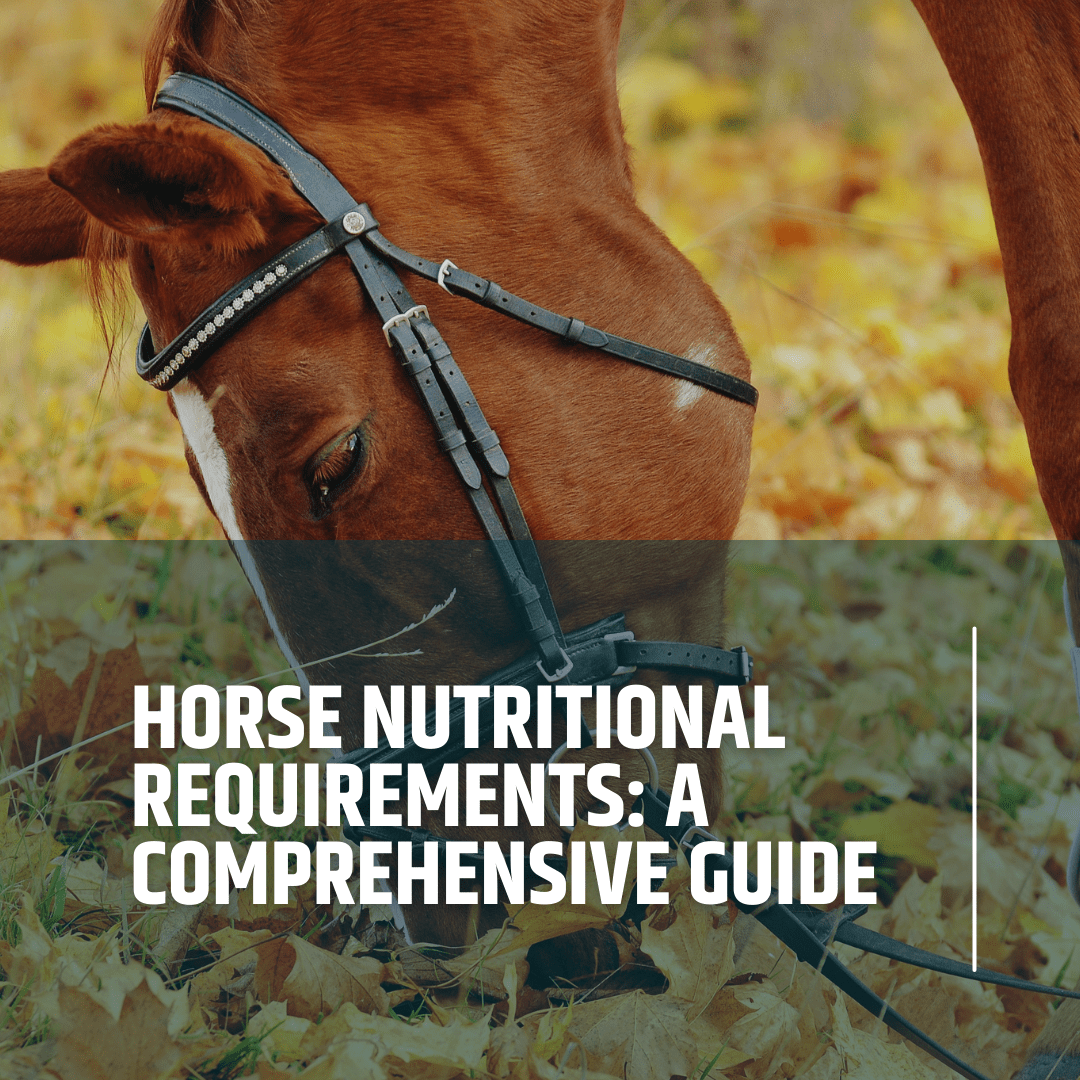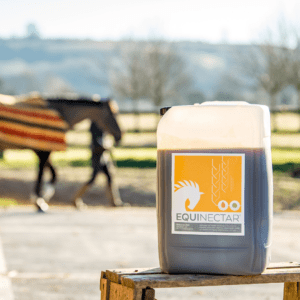
01
Introduction
Proper nutrition is vital to the health and well-being of horses, influencing their growth, performance, and overall quality of life. Like all animals, horses have specific nutritional needs that vary according to their age, activity level, breed, and health status. Feeding horses the appropriate diet requires understanding these requirements and offering a well-balanced diet to meet them. In this blog, we will explore the core components of a horse's diet, including energy, protein, vitamins, minerals, water, and fibre. We will also consider factors that influence the nutritional needs of horses and offer best practices for feeding management.
02
The Basic Nutritional Components
Energy
Energy is perhaps the most critical factor in a horse's diet. Energy itself is not a nutrient, but it is required for maintenance of the horse—movement, breathing, maintaining body condition, digestion, blood circulation, and many other bodily functions (3). Horses require energy to sustain basic metabolic functions, maintain body condition, and perform activities such as walking, running, and working. Energy for horses comes primarily from carbohydrates and fats, which are metabolised to fuel bodily functions (3).
Carbohydrates in a horse's diet are derived mainly from forages such as hay and pasture, as well as from grains like oats, barley, and maize. These carbohydrates can be classified into two types: structural and non-structural (3). According to Zynda et al. (2022), structural carbohydrates, found in hay and grass, consist mainly of cellulose, which is broken down by microbes in the horse's hindgut (3). Non-structural carbohydrates, like sugars and starches in grains, are digested more rapidly and provide quick energy (3). Care must be taken with grains, as excess starch intake can lead to issues such as colic and laminitis.
Fats are another important energy source for horses, particularly those with high energy demands. Fats provide more than twice (approximately 2.25 times) the energy per gram compared to carbohydrates, making them a valuable addition to diets for performance horses (3). Sources of fat can include vegetable oils or commercial fat supplements. Unlike carbohydrates, fats do not carry the risk of digestive disturbances when fed in moderation.
Protein
Protein is essential for the growth, repair, and maintenance of tissues, including muscles, skin, hair, and hooves (4). Horses also rely on protein to produce enzymes and hormones that regulate bodily functions. Protein is composed of amino acids, some of which are essential and must be obtained through the diet, as the horse's body cannot synthesise them.
Quality protein sources include legume hays like alfalfa, soybeans, and commercially prepared feeds that contain adequate levels of amino acids such as lysine, which is often the first limiting amino acid in horse diets. Young horses, pregnant or lactating mares, and horses engaged in strenuous work have increased protein requirements. While protein is crucial, excessive protein can lead to unnecessary stress on the kidneys and increased water needs, so it is important to ensure a balanced intake.
Indicators of protein deficiency include a dull or coarse coat, weight loss, and decreased growth, milk production, and overall performance (4).
Vitamins
Vitamins are organic compounds that play vital roles in many physiological processes. According to Kentucky Equine Research (2011), horses require both fat-soluble vitamins (A, D, E, and K) and water-soluble vitamins (B-complex and C) (5).
Vitamin A: is important for vision, reproduction, and immune function. Horses usually obtain sufficient Vitamin A from fresh forage, but stored hay loses its vitamin content over time, so supplementation may be necessary during winter months.
Vitamin D: is essential for calcium regulation and bone health. Horses synthesise Vitamin D from sunlight, but horses kept indoors or in regions with limited sunlight may require supplementation.
Vitamin E: acts as an antioxidant, protecting cells from oxidative damage. It is also important for muscle health and immune function. Vitamin E is typically present in fresh pasture, but like Vitamin A, its levels diminish in stored feed.
Vitamin K: is required for blood clotting and is usually abundant in green forages and produced by gut microbes.
B-complex vitamins are involved in energy metabolism and red blood cell production. These are generally synthesised by bacteria in the horse's gut, but horses with poor gut health may need supplementation. Vitamin C is synthesised in the liver, and under normal conditions, horses do not require dietary Vitamin C.
Minerals
Minerals are divided into two categories: macrominerals and microminerals, both of which are essential for a horse's health (6).
Macrominerals, such as calcium, phosphorus, magnesium, sodium, potassium, chloride, and sulphur, are required in larger quantities (6). Calcium and phosphorus are particularly important for bone health, with an ideal calcium-to-phosphorus ratio of approximately 2:1. Magnesium is involved in muscle function, and sodium, potassium, and chloride maintain fluid balance and nerve function. A salt lick or electrolyte supplement can help ensure adequate intake of these minerals, especially for horses that sweat heavily.
Microminerals, including copper, zinc, selenium, and iron, are needed in trace amounts but are still critical for numerous bodily functions (6). For instance, selenium works in conjunction with Vitamin E as an antioxidant, and zinc supports skin and hoof health. Horses grazing on selenium-deficient soil may require supplementation, as insufficient selenium can lead to muscle disorders.
Water
Water is arguably the most important nutrient for horses. An average horse requires 25 to 55 litres of water per day (or 5 litres of water per 100 kg body weight), but this can vary based on temperature, workload, and dietary factors. Horses consuming dry feed, such as hay, require more water than those on fresh pasture (7). Dehydration can lead to serious health issues such as colic and impaction, so it is essential that horses have access to clean, fresh water at all times (1).
Fibre
Fibre is a key component of the equine diet, as horses are natural grazers with digestive systems designed to process fibrous plant material (1). Forages like grass, hay, and haylage provide the bulk of a horse's fibre intake. Fibre is fermented by microbes in the horse's large intestine, producing volatile fatty acids that serve as a significant energy source.
Forage is a vital source of fibre and key nutrients, but its nutritional composition, including sugar content, can vary (1). To ensure your horse is receiving the right nutrients, you can send a forage sample to a feed company for analysis. They can provide insights on the results, which is especially important if your horse is overweight, has equine metabolic syndrome (EMS), or is prone to laminitis. In such cases, it’s typically safer to use forage with less than 10-12% sugar and starch (1).
A diet high in fibre helps to maintain gut health, prevent colic, and promote natural feeding behaviours. It is recommended that horses consume at least 1.5% to 2% of their body weight in forage daily (2). Feeding too little fibre can lead to digestive disorders, behavioural problems, and weight loss.
03
Factors Influencing Nutritional Requirements
The nutritional needs of horses are not static; they vary based on several factors (8):
- Age
Foals, growing horses, and senior horses have distinct nutritional requirements. Young horses need higher levels of protein, vitamins, and minerals to support growth, while older horses may require adjustments in diet to accommodate changes in metabolism and dental health.
- Activity Level
Horses engaged in light work, such as pleasure riding, have lower energy and protein needs than performance horses involved in racing, eventing, or endurance. High-performance horses require more concentrated energy, which can be provided through fats and carbohydrates, as well as additional electrolytes to replace those lost through sweat.
- Reproductive Status
Pregnant and lactating mares have increased nutritional demands, especially for protein, energy, and calcium. These requirements are highest in late gestation and early lactation, as the mare must support both her own body condition and the growth of the foal.
- Health
Horses with certain health conditions, such as metabolic disorders, gastric ulcers, or dental problems, may require special diets. For instance, horses with insulin resistance may need a low-sugar, high-fibre diet, while those prone to gastric ulcers benefit from frequent, small meals of fibrous forage to buffer stomach acid.
04
Daily Energy Requirements for Horses
A horse's daily energy requirement varies based on factors such as age, weight, activity level, and overall health. Energy is typically measured in megajoules (MJ) of digestible energy (DE), and it's essential to match the horse's intake with their energy expenditure to avoid issues like obesity or malnutrition. Below, we break down the estimated energy requirements based on different activity levels, from maintenance (inactive) horses to high-performance athletes.
The table below illustrates a clear overview of the energy requirements for horses in different work levels (10 & 11) :

1. Maintenance (Inactive Horse)
Horses at maintenance are typically not engaged in any significant physical activity and may be pasture-kept or lightly ridden on occasion. These horses require only enough energy to sustain basic bodily functions such as breathing, digestion, and maintaining body temperature.
Energy Requirement: Approximately 33 to 70 MJ/day of digestible energy, depending on the horse’s size and metabolism.
For a 500 kg horse, the daily energy requirement would be around 70 MJ.
Larger or smaller horses will have different needs, so adjustments should be made according to body weight.
2. Light Work (Occasional Activity)
Horses in light work engage in minimal to moderate physical activity, such as recreational riding, light schooling, or low-level competition once or twice a week. These horses burn more calories than those at maintenance but still require a relatively moderate amount of energy.
Energy Requirement: Approximately 80 to 90 MJ/day for a 500 kg horse.
Horses involved in light work need an additional 20-30% more energy than those at maintenance.
3. Moderate Work (Regular Activity)
Moderately worked horses are more active, participating in consistent daily exercise or training. This category includes horses involved in activities such as show jumping, dressage, or competitive trail riding. They require a higher caloric intake to meet the increased energy demands of this level of work.
Energy Requirement: Approximately 100 to 120 MJ/day for a 500 kg horse.
Horses in moderate work typically require around 40-60% more energy than those at maintenance.
4. Heavy Work (Intense Activity)
Horses engaged in heavy work include those involved in racing, eventing, endurance riding, or other physically demanding activities. These horses require significantly more energy to fuel both their physical performance and recovery.
Energy Requirement: Approximately 120 to 150 MJ/day for a 500 kg horse.
Heavy work can increase a horse's energy needs by 80-100% compared to those at maintenance.
5. Very Heavy Work (High-Performance Horses)
At the highest end of the energy spectrum are horses in very heavy work, such as elite racehorses, high-level endurance competitors, or military horses on active duty. These horses require vast amounts of energy, and their diets need to be carefully managed to provide the necessary nutrients without overloading their digestive systems.
Energy Requirement: Approximately 150 to 180+ MJ/day for a 500 kg horse.
High-performance horses may require more than 100% additional energy compared to maintenance levels.
Providing horses with the appropriate amount of energy for their level of activity is essential for maintaining a healthy body condition, supporting optimal performance, and preventing metabolic disorders.
05
Best Practices for Feeding Horses
1. Feed Little and Often
Horses are designed to graze throughout the day, and their digestive system functions best with a steady intake of small amounts of food (1). Feeding two or three large meals per day can overwhelm their digestive system and increase the risk of colic. Instead, offer frequent, smaller meals.
2. Provide Consistent Access to Forage
High-quality forage should form the foundation of any horse's diet (1). Ensure that hay or pasture is available at all times, or as often as possible, to promote digestive health and prevent boredom.
3. Monitor Body Condition
Regularly assess your horse's body condition using a scoring system that evaluates fat cover over key areas like the ribs and withers. Adjust feeding practices based on weight changes to maintain a healthy body condition (9).
4. Offer Clean, Fresh Water
Ensure that your horse has access to clean water at all times, and consider offering electrolytes during hot weather or periods of intense exercise (1).
06
Conclusion
Meeting a horse's nutritional requirements is a complex task, requiring careful consideration of their energy, protein, vitamin, mineral, water, and fibre needs. A balanced diet is essential for maintaining health, supporting performance, and promoting longevity. By understanding these core components and adjusting feeding practices to meet the individual needs of each horse, owners can ensure their horses thrive in every stage of life.
References
(1) The British Horse Society. (2024, February 27). Feeding Horses. https://www.bhs.org.uk/horse-care-and-welfare/health-care-management/horse-health/feeding-horses/
(2) Ermers, C., McGilchrist, N., Fenner, K., Wilson, B., & McGreevy, P. (2023). The Fibre Requirements of Horses and the Consequences and Causes of Failure to Meet Them. Animals : an open access journal from MDPI, 13(8), 1414. https://doi.org/10.3390/ani13081414
(3) Zynda, H., Mastellar, S., & Share, E. (2022, March 4). The Role of Macronutrients in Equine Nutrition. The Ohio State University: College of food, agricultural, and environmental science. https://ohioline.osu.edu/factsheet/1023
(4) Williams, C. (2004, April). The Basics of Equine Nutrition. Rutgers University: New Jersey Agricultural Experiment Station. https://esc.rutgers.edu/fact_sheet/the-basics-of-equine-nutrition/
(5) Kentucky Equine Research. (2011, November 21). Vitamins Are Important in Horse Nutrition. https://ker.com/equinews/vitamins-are-important-horse-nutrition/
(6) Hiney, K. (2024, April). Minerals for Horses: Calcium and Phosphorus. Oklahoma State University. https://extension.okstate.edu/fact-sheets/minerals-for-horses-calcium-and-phosphorus.html
(7) Blue Cross. (n.d.). Horse feeding and watering. https://www.bluecross.org.uk/advice/horse/food-and-weight/horse-feeding-and-watering
(8) Ralston, S. (2021, January). Nutritional Requirements of Horses and Other Equids. MSD Veterinary Manual. https://www.msdvetmanual.com/management-and-nutrition/nutrition-horses/nutritional-requirements-of-horses-and-other-equids
(9) The British Horse Society. (2024, August 27). Fat scoring. https://www.bhs.org.uk/horse-care-and-welfare/health-care-management/horse-health/fat-scoring/
(10) National Research Council, 2007. Nutrient requirements of horses: 6th ed. Washington, D.C.: The National Academies Press. https://nap.nationalacademies.org/catalog/11653/nutrient-requirements-of-horses-sixth-revised-edition
(11) Geor, R., Harris, P., & Coenen, M. (2013). Equine Applied and Clinical Nutrition, (1st ed.). Saunders. https://www.amazon.co.uk/Equine-Applied-Clinical-Nutrition-VitalSource-ebook/dp/B00BGNYKI8
ABOUT EQUINECTAR
Description
EquiNectar® is a natural feed supplement, that is scientifically proven to:
- Re-balance your horse’s gut bacteria
- Help your horse maximise benefits from its feed
- Improve your horse’s condition
More information
EquiNectar® is produced by Tharos Ltd in the UK. It is a natural source of digestive enzymes and contains only the following ingredients:
- Our patented enzyme rich malt extract
- Medium chain triglycerides (from coconut oil)
- Potassium sorbate
For more details of the enzymes within EquiNectar® take a look at the ingredients and enzymes page.
How to feed
Simply add EquiNectar® to your horse's daily feed, using the Feeding Rate chart to determine the correct amount.
For detailed instructions about how to introduce EquiNectar, please read the comprehensive Feeding Guide page.





